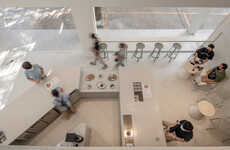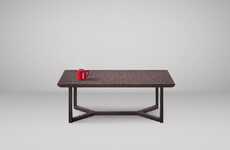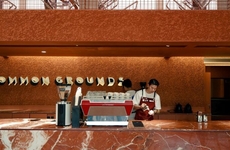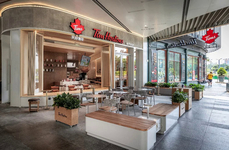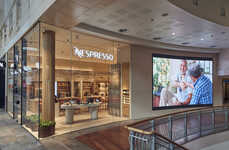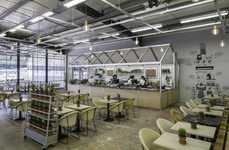
Coffee Ground is an Artisan Cafe Concept in Endsleigh, UK
Rebecca Byers — December 7, 2015 — Lifestyle
References: retaildesignblog.net
Coffee Ground is an aptly named artisan cafe concept centered around incorporating micro-roasting into their retail experience. Designed by Kiwi & Pom, the eclectic cafe resembles a greenhouse and features furniture made from spent coffee grounds such as tables and coffee machine panels, while it is also used to make a soil nourisher that can be used to treat your garden at home.
Coffee Ground's on-site micro-roasting capabilities mean that the artisan cafe concept can slow roast beans in small batches by hand without leaving the premises. In order to make it an educational experience for customers, Coffee Ground features a hand-painted mural wall that illustrates the micro-roasting process in a way that is easy to understand.
Coffee Ground's on-site micro-roasting capabilities mean that the artisan cafe concept can slow roast beans in small batches by hand without leaving the premises. In order to make it an educational experience for customers, Coffee Ground features a hand-painted mural wall that illustrates the micro-roasting process in a way that is easy to understand.
Trend Themes
1. Micro-roasting - Opportunity for coffee shops to incorporate on-site micro-roasting capabilities, providing customers with freshly roasted beans and an educational experience.
2. Upcycling - Opportunity for industries to repurpose waste materials, such as coffee grounds, to create unique furniture and eco-friendly products.
3. Green Design - Opportunity for the design industry to create innovative and sustainable spaces, such as greenhouse-inspired coffeeshops, that promote environmental consciousness.
Industry Implications
1. Coffee Retail - Coffee shops can capitalize on the micro-roasting trend to enhance the customer experience and differentiate themselves in the market.
2. Furniture Manufacturing - Manufacturers can explore using waste materials, like coffee grounds, to create eco-friendly furniture and contribute to the circular economy.
3. Interior Design - Interior designers can incorporate green design principles to create unique and sustainable spaces that align with the growing consumer demand for eco-friendly businesses.
4.5
Score
Popularity
Activity
Freshness

